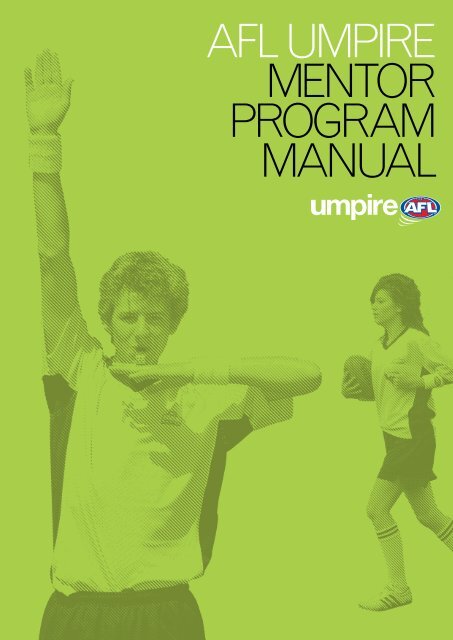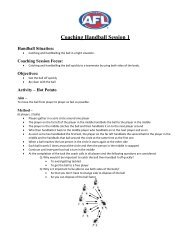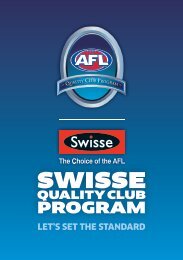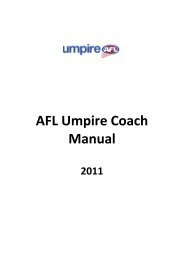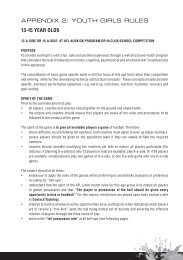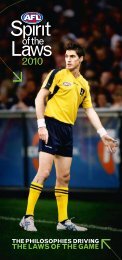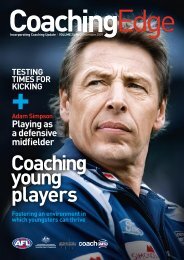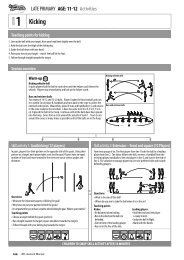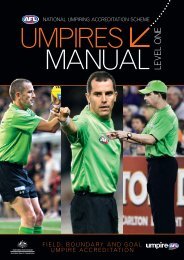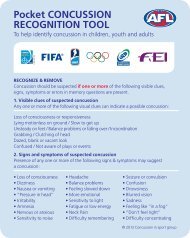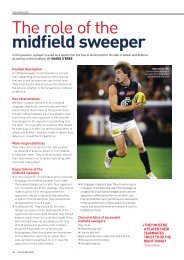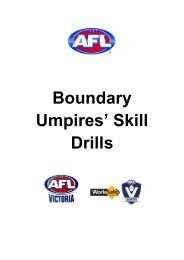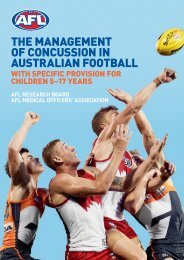AFL UMPIRE MENTOR PROGRAM MANUAL - AFL Community
AFL UMPIRE MENTOR PROGRAM MANUAL - AFL Community
AFL UMPIRE MENTOR PROGRAM MANUAL - AFL Community
- No tags were found...
You also want an ePaper? Increase the reach of your titles
YUMPU automatically turns print PDFs into web optimized ePapers that Google loves.
ContentsOverview of the program....................................................................................................6Acknowledgements.....................................................................................................7Objectives of the program...........................................................................................8Benefits of mentoring to umpiring....................................................................................9Benefits to the mentor............................................................................................9What does a mentor do?........................................................................................9Part 1 – Pre-workshop reading and reflection................................................................10Flow chart outlining mentor training program timeline...............................................11Remember when...............................................................................................................12Identify the challenges faced by the beginning or learning umpire.....................15We all start somewhere.............................................................................................17My first crack at it......................................................................................................18About Mentoring..............................................................................................................20What is mentoring?..............................................................................................20Pathways to mentoring....................................................................................................22Colour recognition.....................................................................................................22Qualities of a mentor........................................................................................................23When can mentoring occur?.....................................................................................25Match-day mentoring...............................................................................................26The S.P.I.R. Method...................................................................................................27Entry-point into umpiring.........................................................................................28Model A for a mentor umpire...................................................................................29Model B for a mentor umpire....................................................................................30Characteristics of beginning umpires.....................................................................31Model A approach – gradual development of the learning umpire......................31Model B approach – fast-tracking the learning umpire.........................................31Focus for first season as a field umpire....................................................................32Providing match feedback...............................................................................................33Communicating with children or teenagers...........................................................33Some tips about communicating with children and teenagers............................33Body language messages – excercise.....................................................................36Feedback during and after the game.......................................................................37Match report and feedback form.....................................................................................38Feedback exercise – What’s your decision? ..................................................................40Tips for mentoring at a distance......................................................................................44Bendigo ACES program...................................................................................................45James McEwan ....................................................................................................45(continued on following page)4<strong>UMPIRE</strong> <strong>MENTOR</strong> <strong>PROGRAM</strong> <strong>MANUAL</strong>
ContentsVictoria Mitchell...................................................................................................45Patrick Gallagher..................................................................................................46Testimonials from mentors...............................................................................................47Andrew Whatley – Bendigo ACES Program......................................................47Michael Hockley – Bendigo ACES Program......................................................47Phil Edwards – Northside J<strong>AFL</strong> Umpires...........................................................47Your own personal goals...................................................................................................48Learning umpire questionnaire...........................................................................49Appendices.......................................................................................................................50Appendix A – Providing mentoring support to business colleagues..............50Appendix B – Umpire match-day feedback ......................................................51Appendix C – Umpire mentor program registration form................................53Appendix D – Making the transition..................................................................54Appendix E – Umpiring on the Web...................................................................55<strong>UMPIRE</strong> <strong>MENTOR</strong> <strong>PROGRAM</strong> <strong>MANUAL</strong> 5
AcknowledgementsThe <strong>AFL</strong> and the author of this guide would like to thank the followingfor their invaluable input and contributions to this resource:Adrian Panozzo (former <strong>AFL</strong> National Umpiring Development Manager).Shane Harris (SANFL Director of Umpiring) for his advice about theSouth Australian mentor program.Rod Threlfall (Worksafe VCFL Umpire Development Manager) for hisassistance in updating this program.Mick Hockley and Andrew Whatley – for their advice andguidance in relation to the mentor program they establishedand run in the Bendigo Umpires’ Association.The Australian Sports Commission – for allowing use of itsMaking Mentors Program.Contributing umpires – Mathew Nicholls, Mathew Head,Gavin Dore, Dean Margetts, Ashley Borg, James McEwan,Patrick Gallagher, Victoria Mitchell, Locky Eccles,Clinton Markwell, Megan Chudleigh and Adrian Fisher.Cricket Australia – for allowing use of its HaveA Go Handbook.Slattery Media Group<strong>UMPIRE</strong> <strong>MENTOR</strong> <strong>PROGRAM</strong> <strong>MANUAL</strong> 7
Objectives of the programThose experienced umpires undertaking this professional developmentprogram as a mentor to beginning or learning umpires can expect to developthe ability to:Communicate with beginning or learning umpires,especially teenagers.Help teach beginning or learning umpires effectivecommunication strategies for match-day, both verbal andnon-verbal (including appropriate signalling).Help beginning or learning umpires prepare mentally fortraining and for match-day.Teach beginning or learning umpires how to acquire theskills they need to operate effectively at their level of thegame and how to improve their skills.Supervise training or practice sessions.Observe the performance of beginning or learning umpiresand determine the level of instruction and guidancethey require.Conduct a post-match analysis and evaluation of thebeginning or learning umpire.Help a beginning or learning umpire conduct a post-matchanalysis and evaluation of his or her own performance.8<strong>UMPIRE</strong> <strong>MENTOR</strong> <strong>PROGRAM</strong> <strong>MANUAL</strong>
Benefits of mentoring to umpiringCan ease the difficulty and cost of providing structured in-house umpiretraining programs.Mentors are experienced umpires who can use their experience to helpthe development of new umpires.Mentoring a beginning or learning umpire can rejuvenate experiencedumpires and give them a new focus and role within the group.Umpires who were mentored as beginning or learning umpires are morelikely to do the same when they have substantial experience.Mentoring beginning or learning umpires can give them the courage toprogress to the next level, thus strengthening the stocks of umpiresin Australian Football.Acts as a pathway to umpire coach accreditation.Benefits to the mentorA renewed enthusiasm and commitment to his or her own umpiring.An opportunity to share his or her knowledge and skills.Well-deserved recognition of his or her own skills and expertise.A chance to learn something new.Promotion of lifelong learning through meaningful relationships.Benefits to the beginning or learning umpire.Increased confidence and motivation.Constructive feedback on performance.Assistance in translating theory into practice.Novice provided with the chance to ‘network’ and enhancecareer prospects.Can minimise the difficulties of attending a structured training course, interms of cost, time, travel, etc.What does a mentor do?Mentors can play a wide variety of roles. Some of these include:Developing the umpires’ knowledge and skills.Being a role model for a beginning or learning umpire.Helping to build the confidence of the umpire they are working with.Being a resource to the umpire they are mentoring – either sharing theirown knowledge or directing the umpire to other sources of information.Challenging and questioning the beginning or learning umpire to reflecton his or her current practice.Being involved in assessing the umpire for a qualification.Providing instructions to other people who can help.Developing greater self-awareness as an umpire (empowerment).<strong>UMPIRE</strong> <strong>MENTOR</strong> <strong>PROGRAM</strong> <strong>MANUAL</strong> 9
Part 1: Pre-workshop reading and reflectionThe purpose of this phase of the training program is to help you focus on the aspects ofumpiring you will have an impact on as a mentor. You will be asked to read and respond to arange of recollections from umpires at various levels of the game.Your responses will make up the first section of the formal training process when you willwork through your reactions with other mentors in the program.This section must be completed by participants BEFORE the Mentor Training Workshop.Your responses here will make up the first section of the workshop, so please ensure yougive them some thought and complete them before the day of the workshop.10<strong>UMPIRE</strong> <strong>MENTOR</strong> <strong>PROGRAM</strong> <strong>MANUAL</strong>
FLOW CHARTOUTLINING<strong>MENTOR</strong> TRAINING<strong>PROGRAM</strong> TIMELINENominations for appropriatementors are sought andaccepted by local coaches.Invites are extended forthose nominated to trainas mentors.Mentors are provided withlearner guides to completesome pre-workshop activities.Mentor training workshop isconducted. Usually takesabout 21/2hours, dependingon group size.Mentor registered.Mentors meet with learnerumpire(s) and complete formon page 27 of learner guidefor each umpire.Mentors to return forms totheir workshop facilitator soinformation on learnerumpires can be collated.Mentor receives benefitspack and starts work withlearner umpire(s).Learner receives benefitspack and starts work as anumpire under mentor’ssupervision.Mentor completescoursework from learnerguide for assessment andaccreditation.Mentors accredited.Coursework is submitted;graduation for mentor.Mentors can apply to an RTOfor nationally accreditedstatement of attainment.<strong>UMPIRE</strong> <strong>MENTOR</strong> <strong>PROGRAM</strong> <strong>MANUAL</strong> 11
Remember when...The following is an actual account of a young umpire’s first foray into the world of AustralianFootball umpiring. The umpire is now an <strong>AFL</strong> field umpire and has officiated in more than50 games.“I vividly recall being petrified of going out there each Sunday knowing I was going to be abused andbeing unsure of what I was really doing. Within two weeks I had gone from watching my mates playfooty to being a field umpire. It all happened very quickly. I started in the Doncaster Juniors in theunder-12s. My first game seemed to go pretty well, I think it was just the adrenalin running throughmy body and my footy background that got me through. I had no reason not to feel confident aboutthe next week. From the moment I got to the ground in Bundoora I started to feel uneasy. I wascompletely alone, there were no umpires’ rooms, no one to point me in any direction. I paid a freekick early in the game and heard a call from the crowd abusing me in some way. It was an off-thecuffcomment that I took offence too. I then paid another free kick and heard some more heckling.I really started to feel conscious about paying free kicks. At quarter-time as the parents walked fromtheir viewing side of the ground through the middle of the ground to hear the coaches, I rememberone parent making some comment about me and everyone else in the area laughing at what he hadsaid. I felt really embarrassed and ashamed. In the second quarter, a player should have got a freekick but I did nothing about it.Instead of being abused by the crowd, I heard nothing, no reaction. “This is better,” I thought tomyself. From then on I decided the best way to not be abused and hassled was not to pay freekicks. A player would get ridden into the ground, which was so obviously a push in the back. “Youjumped forward,” I would justify to myself. Still no abuse. This went on for weeks. I was payingmaybe one or two free kicks a game. This went on until I had a game, still in the under-12s when Iwas being watched by an umpires’ observer. Despite it being a spiteful game, I was still refusing topay free kicks so as not to draw attention to myself. Each game I did, I was hoping that it would endquickly and I could get out of there. During the week, the umpires’ observer spoke to my father andrecommended that maybe umpiring was not right for me. Over the weeks he had received lettersfrom coaches of the teams viewing their concerns. My dad asked about paying free kicks and Iexplained that I was too scared to pay them because they drew attention to me. We then deviseda plan. We looked at <strong>AFL</strong> games and saw that in most games about 30 free kicks would be paid. Iwould look at starting off with trying to pay five free kicks a quarter. No matter what anyone said, Iwould pay this amount or more. My dad would come out to me at each break and tell me how manyI paid. I slowly gained some confidence in paying free kicks. I was then handling games well. I thenwanted to umpire two games a day to try and get it right. In the matter of a couple of weeks, I wentfrom totally despising being out there to not being able to get enough umpiring. There is no doubtthat the earliest part of my umpiring career was the hardest to get through. Once I got through thoseearly stages I was fine.”Field umpire Matthew Head joined the <strong>AFL</strong> panel in 2001. At the end of the 2007 season,Matthew had officiated in 124 senior <strong>AFL</strong> games.12<strong>UMPIRE</strong> <strong>MENTOR</strong> <strong>PROGRAM</strong> <strong>MANUAL</strong>
“I know when I umpired my first football game, I was verbally attacked by a woman brandishing anumbrella on the boundary line, and this was before I had actually walked on to the ground to umpirethe game. So it was a rude awakening to the sport. Experience is the key to umpiring and yet ittakes time to acquire this, which can frustrate you when you are trying to rise through the ranks.Exposure to different situations helps you develop that instinctual reaction when umpiring games.I was fortunate enough to be coached early on by Kevin Mitchell, who instilled in me the professionalaspects of umpiring, on and off the field – the way you dressed and presented yourself at trainingand on game day. Kevin made sure that I was exposed to as much football as possible, at bothjunior and senior level, so that I developed the necessary skills to go on and umpire at <strong>AFL</strong>/VFLlevel. Kevin had just arrived at Dandenong Juniors after a very successful career as a boundaryumpire with the VFL, umpiring in nine Grand Finals, so I always listened intently to what he had tosay. There is also no doubt that as a young umpire you watch the more senior guys and learn fromthem and how they react to certain situations, and that was the case through my career.I guess when you first start out umpiring, it can feel like everyone knows you are new to the joband are quick to expose or take advantage of that. For example, Players may continually questionyour decisions, even though you are probably getting most of them right. However, they see it as anopportunity to perhaps pressure you into giving them one their way. They will try to distract you toallow their teammates the opportunity to block, hold or push their opponents.Players can also intimidate you physically just by their size, and that can be very uncomfortable.Coaches often pick up on the young umpire and pressure him from the sideline,constantly criticising and alerting him to the mistakes he is making. It is important that as anew umpire you try and sell yourself by being positive and strong, blowing the whistle sharplyand signalling with conviction.”Bryan Sheehan umpired 363 <strong>AFL</strong> games at the elite level from 1984-2003, including six Grand Finals,and now coaches and mentors <strong>AFL</strong> umpires.I first learned about umpiring at school, before being mentored at the Moorabbin Saints JuniorFootball League. As a first-year umpire, having a mentor was good because there was alwayssomeone to provide support and tips on how to improve and become a better umpire. Having amentor also helped build my confidence.Megan Chudleigh, 15, Moorabbin Saints Junior Football LeagueAfter three years of mentoring young umpires, I find it very rewarding when they are able to stand ontheir own two feet and do what you have taught them.Most of our first-year umpires start in modified rules games, which is another challenge as theserules can sometimes be a little confusing and difficult for a young umpire to comprehend. I enjoybeing on the ground with new umpires, as I am able to mentor them on the spot, rather than have towait until the end of a quarter.A great highlight for me was that one of the young girls I mentored, Alexandria Anthony, was selectedto umpire a half-time grid game at the 2006 <strong>AFL</strong> Grand Final. That made me extremely proud.Mentoring is very rewarding and keeps you in touch with the many wonderful young people who haveso much to offer.Adrian Fisher, umpire’s advisor, Moorabbin Saints Junior Football League<strong>UMPIRE</strong> <strong>MENTOR</strong> <strong>PROGRAM</strong> <strong>MANUAL</strong> 13
I have been involved in umpiring for 38 years. The reason of late for my longevity in the game hasbeen the introduction of the mentor program in which I was asked to be a part of last year. I wasassigned three young aspiring field umpires taking the whistle for the first time. I quickly found theseyoung men were a delight to work with, and the bond we have established can be attributed to theprogram.From day one we all sat down as a team and discussed what our goals were and where the threewanted to go with their umpiring. Not surprisingly, all three expressed a great desire to umpirefootball to the best of their ability and ultimately at the highest possible level.This encouraged me to play a fundamental role in their development, not just as umpires, but also asboys turning into men.Mentoring has proven to be a rewarding experience for me personally, as it keeps me involved inthe game. More to the point, the mentor program opens new doors for young umpires to achievetheir dreams.Locky Eccles, Warrnambool and District Football Umpires AssociationFor a young person – not just as an aspiring umpire – but also as a person establishing him orherself as an individual, the mentor program is a major factor in helping me develop, from a nervousand apprehensive first-year field umpire into a confident, motivated and knowledgeable young adult.The skills I learned from my mentor are primarily ones which only experience can bring. I havedeveloped skills that will be bound to me for life.The mentor program has given me the capacity to endure, persist and succeed, but more importantly,to enjoy the work I put in.Having the support of a mentor on match-day, at training and after hours has allowed me to show myability in an uncompetitive setting.It has also helped motivate me to pursue bigger dreams.Clinton Markwell, Warrnambool14<strong>UMPIRE</strong> <strong>MENTOR</strong> <strong>PROGRAM</strong> <strong>MANUAL</strong>
Identify the challenges faced by the beginning or learning umpireHaving read the accounts by a range of umpires dealing with their first fewgames of Australian Football, what would you identify as the issues thatinitially made it a difficult job?<strong>UMPIRE</strong> <strong>MENTOR</strong> <strong>PROGRAM</strong> <strong>MANUAL</strong> 15
In each umpire’s account of his early days, what things encouraged himto stick at it?“Glenn James was my mentor when I first got on the list. We trained from his place pre-season untilhe retired. The main things he impressed on me were: (1) to make each training session a qualityone; (2) incorporate a balanced lifestyle with umpiring, i.e. family and work; (3) watch your diet! Healso taught me a lot about tolerance, as being an umpire requires you to have a thick hide and focuson the things that are important to you in your job and ignore the idiots around you. The commentspeople threw at him as we ran around where we trained really shocked me, but this was 23 years ago!Field umpire Gavin Dore umpired 302 senior <strong>AFL</strong> matches including the 1996 <strong>AFL</strong> Grand Final.16<strong>UMPIRE</strong> <strong>MENTOR</strong> <strong>PROGRAM</strong> <strong>MANUAL</strong>
We all start somewhere...Read the following account of another <strong>AFL</strong> field umpire’s first foray into umpiring.It is a refreshing reminder that no matter what level you eventually achieve as an umpire,you have to start somewhere.I remember my first game in 1992. It was a Sunday morning at Moore Park in Reservoir for an under-13s practice match between West Preston and Reservoir Colts. I’d missed out on the under-9s andunder-10s games, but assured the umpires’ coach that I could do an under-13s game. He wasn’t sosure, but gave me a go anyway.I’d been out shopping during the week to get some white boots – not the easiest things to find – andhad gone away with some moulded-sole adidas boots that were three or four sizes too big for me.A little cotton wool in the ends would fix that, or that’s what I thought! I was dressed in my new whitekit and strode out on to the rock-hard ground ready and raring to go.Actually, I wasn’t ready at all. Being the chubby little 14-year-old that I was, I had absolutely NOfitness. I didn’t have a clue about where to run or even what a free kick was, but I’d played fora couple of years and figured I could get through on that experience. I’d had no coaching, noinstructions. I hadn’t even seen a rule book! I don’t even want to think about how I bounced the ball.By 15 minutes into the first quarter, the chaffing on my thighs was so bad that I could hardly walk,let alone run! People were screaming at me and abusing me and my feet were killing me. I shouldn’thave worn those brand new boots; runners would have been a much better option, but I thought Ihad to wear boots. Well, nobody told me otherwise! It was hot, and I was struggling – big time!I’m still not sure how I made it through that game, but I fronted up again the next weekend andthings just went from there.Field umpire Mathew Nicholls was promoted to the <strong>AFL</strong> senior panel and umpired his first game in roundtwo of the 2003 season. He had umpired 65 games at the end of the 2007 season.On the next page you will be given a section to record some of your earliest moments as anumpire in Australian Football. A mentor should be able to empathise with a beginning orlearning umpire and share with him or her what it was like as a new umpire.<strong>UMPIRE</strong> <strong>MENTOR</strong> <strong>PROGRAM</strong> <strong>MANUAL</strong> 17
My first crack at itAs a mentor, your ability to understand what emotions, aspirations, fears, challenges andgoals a beginning or learning umpire might be confronting will be crucial. The longer youhave been umpiring, the further back you will have to go to recall those early days – althougheveryone will have one or two of those moments that will never leave them.As an umpire rises through the ranks, he or she becomes a new umpire to some extentat each level of the game and there are new challenges to confront. Before reflecting on oneor two of your earliest memories, think back to what Mathew Head, Bryan Sheehan andMathew Nichols wrote about their early experiences.Take time now, in the space provided, to recount two or three of your early memories as anumpire that might be useful when working with a beginning or learning umpire. They maynot necessarily be from your very first matches, but from your first grand final – as long asthe anecdote would have some value to another umpire who wants to learn more about thegame and develop his or her skills.18<strong>UMPIRE</strong> <strong>MENTOR</strong> <strong>PROGRAM</strong> <strong>MANUAL</strong>
<strong>UMPIRE</strong> <strong>MENTOR</strong> <strong>PROGRAM</strong> <strong>MANUAL</strong> 19
About MentoringExtractions in this section adapted from Australian Sports Commission– Making Mentors, 2002.What is Mentoring?Mentoring is nothing new – particularly in sport. We have all turned to an experiencedfriend or colleague for advice, especially when we are learning something new or are facinga new challenge.Most sportspeople and many coaches and officials would freely admit they have soughtthe advice of an experienced player, coach or official at some point in their career.What is new, however, is the concept of using a mentor in a more structured way to helpguide you through a challenging learning process.Think back to your earliest games as an umpire. What were some of the immediatechallenges you faced? Managing the players? The abuse from the crowd? Aggression?Knowing the rules? Being fit enough to do your job as an umpire? The pressure of gettingit right in the heat of the moment? Those times when you got it wrong?Have a quick think about the immediate challenges you faced as a fledgling umpire, andlist them below.20<strong>UMPIRE</strong> <strong>MENTOR</strong> <strong>PROGRAM</strong> <strong>MANUAL</strong>
Mentoring is a highly effective way for new umpires to learn the ‘art’ of their role and applytheory they may have learnt in the classroom or through independent study. Mentors canbring life to a theoretical concept, demonstrate practical officiating skills, be a soundingboard for problems, help you to identify weaknesses or be a source of motivation anda reminder that you are doing a great job!Mentoring relationships can be formally structured, with mentors assigned to umpires,or they can grow out of a chance encounter with a like-minded umpire and remain veryinformal. They can be equally as useful for a new umpire just starting out in the sport asfor an elite umpire with significant experience. It doesn’t matter what form a mentoringrelationship takes, as long as the umpire and the mentor see value in the relationship andit helps both to develop and become better at their jobs.“Mentoring is a process rather than an event; mentors must see themselves as managersof a process rather than passing on knowledge.”Galvin, 1998<strong>UMPIRE</strong> <strong>MENTOR</strong> <strong>PROGRAM</strong> <strong>MANUAL</strong> 21
Pathways to MentoringEvery mentoring scenario will take a different shape, as every umpire you will work withwill have different skills and attributes and display differing levels of competency. Theenvironment in which the mentoring takes place will also be a significant factor.Mentoring will take place at all different levels of the game and thus a mentoring approachneeds to be adapted to the level at which you are working.The following pages will outline some pathways to umpiring that a junior umpire mighttake and the role of the mentor in this process.Colour recognitionIt is worth discussing the issue of wearing a different colour with the new umpire you arementoring. Identifying him or her as a learner can have a range of different responses –much in the same way as placing ‘L’ or ‘P’ plates in a car. The umpires from the BendigoACES program have given almost unanimous support for wearing a different colour andemphasise that supporters, coaches and players all know they are learning the role of centralumpiring and therefore go a little easier on them.An older or adult umpire might find this especially the case, as most supporters wouldexpect an adult to be an experienced umpire, not a learner, and feel they are fair game forabuse. Again, evidence out of the Bendigo ACES program suggests adult learners wouldprefer to wear an identifying coloured shirt.22<strong>UMPIRE</strong> <strong>MENTOR</strong> <strong>PROGRAM</strong> <strong>MANUAL</strong>
Qualities of a MentorMentors come in all shapes and sizes, but to be effective they need to have appropriateknowledge, skills and attitudes. Knowledge may include their understanding of technicalumpiring matters such as the rules and how they are interpreted, understanding people andwhat makes them tick (especially in pressure situations during a game), their understandingof the umpiring process, their political awareness, etc. Skills might include honesty,empathy, planning, goal setting, time/people/process management, and the ability tocommunicate one-on-one with individuals from a range of backgrounds. Attitudes mightrelate to the process of mentoring, philosophy towards umpiring, attitudes about the leagueor group they work within, as well as their general outlook on life.Some of the qualities mentors should possess are:• An ability to focus on the umpiring process, rather than on the umpire’s performance.• A willingness to assist another umpire’s development and growth and create a positiveenvironment for learning.• Exemplary communication and feedback skills (especially with constructive criticism ofthe beginning or learning umpire’s performance).• Up-to-date technical skills and experience as an umpire – preferably they are umpiringthemselves or were recently an umpire with substantial experience.• Trustworthiness and an ability to maintain confidences. The beginning or learningumpire must feel confident he or she can talk openly to the mentor.• An openness to new ideas. Mentors should learn more about themselves and aboutumpiring through the process of umpiring. A mentor should never feel awkward abouthaving to clarify his or her understanding of the technical side of umpiring so as toadvise the beginning or learning umpire.• A strong network of umpiring and football contacts.• Sufficient time and inclination to commit to the mentoring relationship and be easilyaccessible. A beginning or learning umpire must feel free to phone or email with aquestion and get a friendly and timely response from their mentor. The beginning orlearning umpire should never feel he or she is taking the time of an unwilling mentor.• Ability to handle conflict situations.<strong>UMPIRE</strong> <strong>MENTOR</strong> <strong>PROGRAM</strong> <strong>MANUAL</strong> 23
Thinking specifically about those who have had an impact on you as an umpire, in businessor in your personal life, try to identify some of the qualities of that person as a mentor.This person will ideally have inspired you to develop a talent and showed an interest in you.What are the two most significant qualities in this person that you admired and that helpedyou to learn?What are some of the qualities you feel you might be able to tap into to help you operate as asuccessful mentor to young umpires? Refer to the previous pages, look through the qualitiesof a mentor and indicate those on this list that you feel are your real strengths. Add anyothers you feel you possess.Are there any obvious weaknesses you feel you have as a mentor? Self-awareness is animportant skill as a mentor and helps you focus on improving those aspects of yourself thatmight make you a better mentor.24<strong>UMPIRE</strong> <strong>MENTOR</strong> <strong>PROGRAM</strong> <strong>MANUAL</strong>
When can mentoring occur?Mentoring can occur at any stage of the learning and accreditation process. It can becomethe key learning vehicle for umpires undertaking accreditation; it can be a component ofthe umpiring practice requirements, or it can be an informal relationship that is entirelyindependent of the accreditation process.Some other opportunities for mentoring include:At training – A mentor can be invited to attend some of the umpire’straining sessions or he or she may even take part in the training sessionto give the umpire being mentored a chance to see him or her in actionon the training track.At matches – However, you must always consider the effect thatany mentoring will have on the performance of the umpire. Perhapsscheduling some time with a mentor after a game to review the umpire’sperformance is the best compromise.Consider the possible positive or negative impacts on an umpire if you give him or heradvice at each break.<strong>UMPIRE</strong> <strong>MENTOR</strong> <strong>PROGRAM</strong> <strong>MANUAL</strong> 25
Video analysis – It may be difficult to have a mentor attend a practicesession or even a match for that matter, particularly in rural areas. Agood alternative is to videotape the practice session or match and sendthe tape to the mentor for comment. It is also important in this scenarioto provide the mentor with some background information about thepractice session or the match that is the subject of the videotape. Itmight also be an idea to focus on a particular goal for the session forthe mentor to comment on specifically or to focus on. Eg.: “I was reallylooking at my set kick management in this game – particularly in liningup players shooting for goal. I wanted to make sure my instructions wereclear to the player taking the kick as well as to the other players aroundthe mark.” The video process should be a catalyst for discussion andfeedback and should ideally have some form of written feedback for theumpire being viewed. A feedback form, such as one on page 38 in thistraining manual, is a good idea.Planning of sessions/seasons – Having a mentor comment on planscan help to identify any shortcomings and enable coaches to build betterplans for the future. Goal setting as part of the mentoring process will bedealt with later in this training manual.Match-day mentoringMany of the beginning or learning umpires you will work with as a mentor will be betweenthe ages of 12 and 16, although a beginning or learning umpire may be any age. Similarly,mentoring need not necessarily be only for entry-level umpires. Even <strong>AFL</strong> umpires requirementors so they can be at their best.When undertaking your mentor’s role on match-day, a structured approach is vital. On thefollowing page is a method for coaching taken from Cricket Australia’s publication, Have aGo Handbook.26<strong>UMPIRE</strong> <strong>MENTOR</strong> <strong>PROGRAM</strong> <strong>MANUAL</strong>
SPIRThe S.P.I.R. MethodWhen teaching a new skill to an umpire, the S.P.I.R. method offers an approach that may beadopted by the mentor. It has been proven to be an effective way to assist children learn anddevelop new skills.Take some time and fill in your own examples in the right-hand column.HOW (demonstrate)Name the skill you will be focusing on with the umpire.Show how to execute the entire skill.While making instructional points to the umpire, showthem again.Make sure you try to “keep it simple” and give them asfew points as possible – perhaps keeping it at underthree.RACTISEGive them a chance to ask questions.Finally demonstrate one more time, asking the umpireto again watch closely.Get the umpire to practise the new skill immediately.Children will copy what they have been shown.Get them to demonstrate the whole skill first.If required, break the skill into individual parts.NSTRUCT (or correct errors)EWARDObserve the umpire either during practice or during amatch.Repeat the key point (if this is done during a match,perhaps wait until a quarter break).Provide further instruction if required.Praise good effort as well as good results. Rememberthat while learning, the beginning or learning umpirewill not always get it right. Look at ways of pullingpositives out of the effort he or she has shown.Show pleasure in their efforts. This will come naturally,no doubt, as you see the impact you are having as amentor, but always keep this as an emphasis.If you are working with a range of umpires, make sureyou are recognising them all. Sometimes we find iteasy to forget elite performers, or we struggle withthose who are having real difficulties. Make sure theseumpires are always recognised.ExamplesHand shakeBuilding rapport and respectPositive body language<strong>UMPIRE</strong> <strong>MENTOR</strong> <strong>PROGRAM</strong> <strong>MANUAL</strong> 27
ENTRY-POINTINTO UMPIRINGFIRST STEPSJunior umpire runs theboundary to get a feel forthe game.SECOND STEPSJunior umpire moves to fieldumpiring under guidance ofa mentor.STEP ONEJunior umpire shadows mentor.Mentor takes time to talk thejunior umpire through the game.Alternate entry pointsUmpire enters as anex-player.Umpire bypasses boundaryumpiring and goes straightinto field umpiring.Parent involved with child’steam moves into umpiring.STEP TWOJunior umpire calls specificdecisions. For example, juniorumpire calls only the marks,mentor makes other decisions.STEP THREEJunior umpires parts of thegame, alternating with mentorwho continues giving support.WHEN READYJunior umpire takes control offull game with mentor observingfrom the boundary andproviding support duringand after the game.28<strong>UMPIRE</strong> <strong>MENTOR</strong> <strong>PROGRAM</strong> <strong>MANUAL</strong>
A ‘staged’ approach to mentoringEach experience with a ‘learner’ umpire will be different.As a result taking a ‘staged’ approach will allow you topace the types to experiences and methods you will useto develop an umpire that you are mentoring. Some timesan umpire may advance through one or more stages andthen revert back depending on the level of competenceand the standard of match.Stage 1 – The first stage involves the learner umpire‘shadowing’ you. This gives them a chance to be out thereseeing and experiencing first hand the game from theumpires perspective. From time to time you should makecomments that provide additional insights into the role,skills and responsibilities of an umpire during the match.Breaks in play and intervals between quarters are a timewhen you should encourage the learner to ask questionsand explain to you what they are ‘picking up’ in termsof the basic skills of umpiring including communication,positioning, decision making, signals and cooperationwith players, officials and other umpires.Stage 2 – Providing the umpire with practical matchexperience is the key to the next stage. Allowing the umpireto do things like – blow the whistle and call in the captains,toss the coin, throw the ball up after a goal, give an all clearafter a score or pay a mark are some of the ways in whichthe umpire can develop confidence, communication anddecision making skills. Many of the ‘in game’ skills are bestdone during the middle of a quarter, and you can use yourjudgement on which and how many that you also introducethe concept of the ‘over rule’ which is done in a supportiveand corrective way so the game is umpire fairly and thelearner umpire and get immediate feedback on what theyare doing well or can improve upon.MODEL ASTEP ONEShadow the mentor on theground.GAME TWOTake only specific decisionsin the game.GAME THREEUmpire all decisions in partsof the game.GAME FOURUmpire whole quarters,building up to a wholematch.GAME FIVEUmpire whole quarters,building up to a wholematch.GAME SIXUmpire whole quarters,building up to a wholematch.GAME SEVENProgress to higher gradecompetition.<strong>UMPIRE</strong> <strong>MENTOR</strong> <strong>PROGRAM</strong> <strong>MANUAL</strong> 29
Be aware that the learner umpire is trying to processmany things, often for the first time, so when and howyou provide feedback and ask questions is important.Clear breaks in play (after a goal) and the time betweenquarters are good examples.Stage 3 – As you gain a greater understanding ofthe learner umpires abilities you can begin to providethem with greater exposure to periods of the matchwhere they are in control. You may even considerthem starting quarters, and completing paperwork.At any time you may utilise strategies described inearlier stages to support the umpires development.Stage 4 – By this stage the umpire is controllingextensive periods of the match. You may even beobserving from the sidelines. Again there is flexibilityin your approach. An example of this may be when anumpire advances to a higher standard or experiencesa challenging period during a match. At any time youmay use strategies from earlier stages to help supportand encourage the umpires development.MODEL BGAME ONEShadow the mentor duringfirst quarter.GAME ONETake control of second quarterin the game.GAME ONETake control of the final quarter.GAME TWOMove to one-umpire systemand umpire whole match.GAME THREEProgress to higher gradecompetition.30<strong>UMPIRE</strong> <strong>MENTOR</strong> <strong>PROGRAM</strong> <strong>MANUAL</strong>
Characteristics of beginning umpiresOn the previous two pages, there are two potential pathways for a mentor umpire.Review the two models and list the characteristics you would be looking for when adoptingeither model. List also the characteristics of the mentor umpire you would be looking forwhen following either model.Model A approach – gradual development of the learning umpireThe characteristics I would be observing to consider a gradual development plan with alearning umpire are:Model B approach – fast-tracking the learning umpireThe characteristics I would ideally be observing to consider fast-tracking a learningumpire are:<strong>UMPIRE</strong> <strong>MENTOR</strong> <strong>PROGRAM</strong> <strong>MANUAL</strong> 31
Focus for first season as a field umpireThe speed at which the new umpire progresses will vary from individual to individualand every mentor will need to exercise his or her judgement about this process. The stage atwhich the new umpire is ready to take a full game might come very quickly or it mighttake many games.This process is intended to be tailored by you as the mentor. Use your discretion andapply the process to be outlined in the way you feel best fits the new umpire. Keepin mind their age, maturity, experience and personality.As a starting point, it is a good idea to get to know them personally so they feelcomfortable with you. On page 53 (appendix c) there is a simple form you may useto help build this rapport. It will also be a useful resource as you learn more about theumpire. It will be especially useful if you are mentoring a range of umpires. Perhaps youmight be working with four at one time. A ratio of 1:4 is generally regarded as appropriate.If you take on more than this, you might find the workload too onerous.32<strong>UMPIRE</strong> <strong>MENTOR</strong> <strong>PROGRAM</strong> <strong>MANUAL</strong>
Providing match feedbackSome important advice on communicationCommunicating with children or teenagersAs much of your role as a mentor will require you to communicate with teenagers, it isappropriate to examine some of the more important aspects of this. We will examine some ofthe more general rules about communication – those that apply to all situations, those thatapply to children and those that apply to adults. The following section should help shape theway you communicate with the beginning or learning umpire, during the match and aftermatches or at training, both verbally and in writing. Remember, communication is a skilland, like all other skills, requires practise and reflection to improve.Some tips about communicating with childrenand teenagers:Draw young people out to speak about the things on their minds. If theperson you are mentoring seems to be a little upset about a particularmatch or aspect of a match, work on getting him or her to verbalise whatis going through his or her head.You can ‘prime the pump’ by talking with them about their favouritefoods, toys, movies, video games, etc. Basically, this means starting withsomething a little more informal, then moving on to the aspect of thegame or performance you wish to address.Verbally reflect on the emotions of a young person before givingin to your need to teach him or her something. You can do this byparaphrasing – repeating what they have said, but in your own words –to ensure you have got the message straight.Adults are constantly making the error of educating young people whenthat person expresses pain. “I had an absolute shocker today – I don’tthink I can make it as an umpire” is often met with, “You did fine” andthe child may be left to feel all alone with what could become a problemfor them. It is important to deal with the negative feelings of poorperformance, because he or she will have bad days even if they make itto the top.Lower yourself physically to a young person’s level by sitting down,bending down or sitting on the floor.It may have been months since any adult has joined the young personon his or her own level. Sit with them on the bench after a game ratherthan stand over them and talk down to them.Tell the young umpire anecdotes about your past and/or presentexperience as an umpire.<strong>UMPIRE</strong> <strong>MENTOR</strong> <strong>PROGRAM</strong> <strong>MANUAL</strong> 33
You can make up the stories, but it is preferable to draw them from yourown experience, especially as a new umpire. This manual will be a greatresource for you in the types of anecdotes to share with a developingumpire. There are anecdotes from a range of umpires at a range of levels,but perhaps the most important and useful ones will be those from yourown experience. The ones you have recounted earlier in this manual willbe useful in the right circumstances!Act on the promises that you make the beginning or learning umpire.Children and teenagers are usually more hurt than adults by broken promises. Ironically,many people treat their promises to children and teenagers as less important than theirpromises to adults. Remember, as a mentor, you need to follow up with the umpire you arementoring. If this means you can’t promise time, then don’t. In your own umpiring network,you may well have other people you can refer the beginning or learning umpire to for extrasupport.Master the art of Socratic questioning. This means that instead ofexpressing facts or lecturing, you ask a question to stimulate the youngperson’s own reasoning process. Socratic questioning opens up a placein a person’s mind for the answer to be remembered. For example, youcould ask, “How do you think you could have managed that set kick infront of goal a bit better?” instead of telling the umpire what to do.Professor Albert Mehrabian has pioneered the understanding of communications sincethe 1960s. He received his Ph.D. from Clark University in the US and in l964 startedan extended career of teaching and research at the University of California, Los Angeles.He devotes his time to research, writing and consulting as Professor Emeritus ofPsychology, UCLA.Aside from his many and various other fascinating works, Mehrabian established this classicstatistic for the effectiveness of spoken communications:7 per cent of meaning is in the words that are spoken.38 per cent of meaning is paralinguistic (the way that the words are said).55 per cent of meaning is in facial expression.34<strong>UMPIRE</strong> <strong>MENTOR</strong> <strong>PROGRAM</strong> <strong>MANUAL</strong>
Mehrabian’s model has become one of the most widely referenced statistic incommunications. The model is particularly useful in illustrating the importance ofconsidering factors other than words alone when trying to convey (as the speaker)or interpret (as the listener) meaning. Style, expression, tone, facial expression andbody language account for 93 per cent of meaning. Keep this in mind when you arecommunicating with an umpire over the phone or even via email, which we willaddress soon.The understanding of how to convey (when speaking) and interpret (when listening)meaning is essential for effective communication, management and relationships,especially in a mentoring relationship which, by nature, needs to be built on trustand clear, open and effective communication.While Mehrabian’s research was for spoken communications, these statistics alsogive a strong indication to the effectiveness or otherwise of written (memo, email,etc) and telephone communications, which are not nearly so reliable and effectiveas generally believed.Telephone communication can convey words and the way the words are said, butno facial expression, which explains why telephone communications are not suitablefor sensitive or emotional issues or for difficult or detailed discussions.The Mehrabian statistics also suggest that typical video-conferencingcommunications are not nearly as reliable as face-to-face communications,because of the intermittent transfer of images, which is, of course, incapableof conveying accurate non-verbal signals.<strong>UMPIRE</strong> <strong>MENTOR</strong> <strong>PROGRAM</strong> <strong>MANUAL</strong> 35
Body language messages – excerciseLook at the following two photographs of someone communicating over the phone.What do the facial expressions suggest about the communication that may not be conveyedbecause it is a phone conversation?Remember that the umpire you are mentoring may not have much support aroundhim or her. This is especially likely to be the case if the umpire is from a regional area. Makesure you provide plenty of support and encouragement and help them find the informationand expertise they need to learn. It can also be helpful to set some ground rules at the start ofthe relationship about how and when you will communicate.Don’t forget that learning is a social activity. There is no harm in having some funalong the way by injecting appropriate personal experiences. It would be fair to say that ifthe process wasn’t fun, at least for some part, the umpire may feel disinclined to continuewith the relationship. Remember to follow the ground rules mentioned in this section wheninjecting some humour.A picture tells a thousand words. Never underestimate the value of a videotape whenmentoring at a distance. Umpiring is a practical activity and, as a mentor, you will be farmore effective if you can actually see the umpire in action. Not everyone has a video camera,but many people can get access to one given enough time – so recommend early in yourrelationship that this may be very beneficial. Always ensure that you respect the privacy ofthe umpire and always return the videotape to them when you have finished with it. If youconsider using it as a coaching tool with another umpire, always get the permission of theumpire first.Email tends to be quite informal.Write your emails as if you were speaking directly to the umpire. If the umpire sends you anemail and you don’t have time to reply immediately, try to acknowledge its receipt within24 hours. This gives the umpire an indication of when you will be able to address the email.Don’t leave it too long, as the implications are that you are not overly interested in your roleas a mentor or in him or her as an umpire.36<strong>UMPIRE</strong> <strong>MENTOR</strong> <strong>PROGRAM</strong> <strong>MANUAL</strong>
Feedback during and after the gameProviding feedback during the game clearly makes up a large part of your role as a mentor,particularly during the ‘run-with’ phase of the umpire’s development. You will be able to talkto him or her during the game and give immediate guidance and feedback.Another crucial aspect will be providing written feedback after their games.This is vital early on in the development of a new umpire. You will have to take some time toconsider the nature of how you approach this.A good rule of thumb is to start informally with beginning or learning umpires. Talkto them to gauge their response to the game they have just been involved in. If they arenegative, take time to work on improving their demeanour before engaging in the writtenfeedback process. Think back to the earlier part of this manual and use one or two anecdotesto lift the spirits of the young umpire after a bad game.When you get to writing feedback for the young umpire, always try to start with positives.Then, think of the next stage as part of a goal-setting process. Look at areas to improve andset some realistic but achievable goals for the umpire and give advice as to what they needto do to achieve them.For example:Position was excellent. Your fitness and speed allowed you to be in the best position to makethe right call most of the time. Next game, focus on you positioning when a player is havinga shot on goal. Make sure you are close enough to enforce the protected space around theplayer. Have a look at footage of an <strong>AFL</strong> game and watch how the umpire handled a set kickin front of goal – especially when there are defenders in close proximity to the player takingthe kick.As a mentor, you can advise the learning umpire to focus on the following aspectsof feedback:Value feedback.Identify strengths and weaknesses..Gain confidence from strengths.Identify strategies for improving weaknesses.Train effectively and/or mentally rehearse correct procedures.The form on the following page is adapted from the <strong>AFL</strong> Umpires’ Logbook© Australian Football League 2002.<strong>UMPIRE</strong> <strong>MENTOR</strong> <strong>PROGRAM</strong> <strong>MANUAL</strong> 37
Match report and feedback formThis will form a significant component of your role as a mentorUmpire’s name:Match reportMatch No.:Match:GradevsDate:Venue:Conditions:Co-umpiresField:Boundary:Goal:Mentor’s nameUmpire’s coach Umpire observer Ump D.O.Senior umpire Football club rep OtherPerformance feedbackDISCIPLINE: FIELD/BOUNDARY/GOAL <strong>UMPIRE</strong>(Delete disciplines not applicable)Rating: NA Not applicable for this disciplineNI Needs improvement at this stageS Satisfactory VG Very good E ExcellentSKILLSMATCH MANAGEMENTIndicationsObservationPositioningRunningTime on/offWhistleBouncingCommunicationComposureControlDecision-makingPresentationSet playsTeam workThrow-insFlag-wavingcontinued on the following page38<strong>UMPIRE</strong> <strong>MENTOR</strong> <strong>PROGRAM</strong> <strong>MANUAL</strong>
Strengths for the game:123Detailed comments:Areas to work on:123Detailed comments:Actions to improve umpiring performance:Signed:<strong>UMPIRE</strong> <strong>MENTOR</strong> <strong>PROGRAM</strong> <strong>MANUAL</strong> 39
Feedback exercise – What’s your decision?Following is a match feedback form for an umpire who has just run his/her third game.The match was run using the two-umpire system with the mentor being the second umpire.This is the written feedback the mentor has given the mentor umpire. You will be asked toread over the feedback and comment on its value for the beginning or learning umpire.40<strong>UMPIRE</strong> <strong>MENTOR</strong> <strong>PROGRAM</strong> <strong>MANUAL</strong>
Match reportUmpire’s name:Billy RODGERSMatch No.:Match:n/a Date: 12/04/04Creswick vs Maryborough Venue: Ballarat OvalGrade u13 Conditions: Wet, very windy and very coldCo-umpiresField:Roger MooreBoundary:George LazenburyGoal:Pierce BrosnanMentor’s nameRoger MooreUmpire’s coach Umpire observer Ump D.OSenior umpire Football club rep OtherPerformance FeedbackDISCIPLINE: FIELD/BOUNDARY/GOAL <strong>UMPIRE</strong>(Delete disciplines not applicable)Rating: NA Not applicable for this disciplineNI Needs improvement at this stageS Satisfactory VG Very Good E ExcellentSKILLSMATCH MANAGEMENTIndicationsNICommunicationNIObservationNIComposureNIPositioningNIControlNIRunningSDecision-makingSTime on/offSPresentationVGWhistleNISet playsSBouncing NAThrow-ins NAFlag-waving NATeam workNI<strong>UMPIRE</strong> <strong>MENTOR</strong> <strong>PROGRAM</strong> <strong>MANUAL</strong> 41
Positives for the game:123Your presentation on the ground was very professional.Your running was good – pretty fit.You made a couple of good decisions.Detailed comments:Keep up the fitness work, it’s got you running well. When you walk out on to the ground,your uniform is excellent which helps to create a good impression.A few of your decisions, especially the one in the last quarter for in the back in front ofCreswick’s goals, were very good.Areas to work on:123Communication, composure and control of the match.Your signalling still needs work.Your observation and positioning still require work.Detailed comments:Once or twice you got flustered by players’ comments and probably some comments comingfrom the boundary line. You will have to improve this. You are pretty fit, but are missing thebest positions to run into, this will have to be something you work on. Be aware that makingthe right signals is not only important to let the players know what’s going on, but also lets thecoaches and supporters know what you are doing. This will help deal with some of thecomments that threw you during the game.Actions to improve umpiring performance:Learn the signals off by heart.Practise running to position.Practise how you talk to the players.Signed: Roger Moore42<strong>UMPIRE</strong> <strong>MENTOR</strong> <strong>PROGRAM</strong> <strong>MANUAL</strong>
What aspects of the written feedback does the mentor handle well?If you were the mentor, which aspects of the feedback would you change and why?What value will the beginning or learning umpire get out of the feedback as it iscurrently written?<strong>UMPIRE</strong> <strong>MENTOR</strong> <strong>PROGRAM</strong> <strong>MANUAL</strong> 43
Tips for mentoring at a distanceExtract adapted from Australian Sports Commission – Making Mentors, 2002.While the principles of good communication still apply when mentoring at a distance, thereare unique issues that need to be considered when you cannot meet the young umpireface-to-face.You may have little knowledge of the umpire and his or her strengths orweaknesses. Start by taking time to get to know them better – get them to tell you aboutthemselves. Ask them what they feel are their strengths and weaknesses and what theywould like to work on as an umpire.Make sure you tell them a little about yourself as well. You might even like to sendthem a video of yourself coaching or umpiring so they can observe your style and approach.You might have started the process by doing this – giving the umpire something he or shecan look at and reflect on.Remember that you (and the umpire) will have no body language to help youunderstand the meaning of the message you are imparting. We rely heavily on bodylanguage to help us decipher the meaning of face-to-face communication. When mentoringat a distance, you will not have the aid of these extra cues and the implied meaning theyadd to communication. Therefore, you should start conservatively (or at least until you knowthe umpire better) in your communication. Don’t be the first to use humour, as humour canbe very culturally specific and may cause confusion or offence. Instead, listen for the style orhumour used by the umpire and try to mirror that.44<strong>UMPIRE</strong> <strong>MENTOR</strong> <strong>PROGRAM</strong> <strong>MANUAL</strong>
Bendigo ACES programMuch guidance and advice in putting this training manual together has been provided byumpiring groups around Australia who run their own mentoring programs. The BendigoFootball League ACES program is one such program.As you take the next steps in actively engaging in the mentoring program, please taketime to read and consider the reflections of three ACES umpires from the Bendigo league.James McEwanJames was a first-year umpire and successfully progressed to under-18 matches.What have been the benefits of having an experienced umpire as your mentor?When umpiring, I was a lot more confident having an experienced umpire as my mentor. Iknew that if I made a mistake for any reason that he would be there to overrule me if that’sthe case. Also, with an experienced umpire officiating with you, if there is a player whowants to challenge any of your decisions and you are not exactly sure if you made the rightdecision, then the mentor will be able to back you up and make you confident with thedecision that you made.Do you think other new umpires should use a mentor and, if so, why?I believe that new umpires should use a mentor because their progress as a field umpire willbe greatly quickened up as they will be able to learn a lot from the mentor and aren’t thrownin the deep end at the start of their careers.Do you have anything else you think is important about learningto be an umpire that you would like to comment on?I believe that having a mentor available for people to start central umpiring with means thatthere will be a lot more people keen and eager to take up umpiring. I believe a lot of peopleconsider it, but decide not to do it as they do not have the confidence to go out there anddo it by themselves. However, having a mentor there to guide them through it, I think theymight give it a crack and find it quite enjoyable, like I have.Victoria MitchellVictoria was a first-year and successfully navigated the domain of umpiring boys’ football.Victoria was 16 for the larger part of the season. She has ambitions to umpire under-18games in the Bendigo league. Victoria had virtually no experience with Australian Footballbefore starting the ACES program. Her background was inrefereeing basketball.What have been the benefits of having an experienced umpire as your mentor?You get to learn from lots of different experienced umpires, their views, what to call and notto call, what angles to run, and also you’re not put out there in the centre by yourself straightaway. You’ve got someone there to help and guide you.<strong>UMPIRE</strong> <strong>MENTOR</strong> <strong>PROGRAM</strong> <strong>MANUAL</strong> 45
Do you think other new umpires should use a mentor and, if so, why?Yes, I think other new umpires should use a mentor because, so far as I know, none of ournew ACES umpires had a bad experience and we all really want to continue.Do you have anything else you think is important about learning to be an umpirethat you would like to comment on?No, just stay focused and work at it.Patrick GallagherPatrick, 18, was a first-year umpire in 2003.What have been the benefits of having an experienced umpire as your mentor?Increased confidence in yourself and about what you’re doing is right. A sense of security isalso achieved via having an experienced umpire with you.Do you think other new umpires should use a mentor and, if so, why?I think other new umpires should use a mentor because it helps newer umpires gain asense of control, a clearer understanding of the rules and delivers positive feedback to themoutlining what they are doing well, and what they need to do and work on to improvetheir skills.Do you have anything else you think is important about learning to be an umpirethat you would like to comment on?A sense of respect is important when learning to be an umpire and is another benefit of beingpart of the ACES program.46<strong>UMPIRE</strong> <strong>MENTOR</strong> <strong>PROGRAM</strong> <strong>MANUAL</strong>
Testimonials from mentorsFollowing are the testimonials of three mentors who have been central to the development ofmentoring programs in Victoria and New South Wales.Andrew Whatley – Bendigo ACES programThe mentoring program I have been involved in with the Bendigo Umpires’ Associationhas had benefits not only to those ‘aspiring’ umpires but also to my satisfaction levels as anumpire. To work with quality young people and, in some cases, not so young people whothat have a goal in mind, and to see them develop skills, knowledge and confidence givesme enormous satisfaction. I have gained much from being a mentor and I would stronglyrecommend anyone with a passion and commitment to the future of umpiring to becomeinvolved in a mentor role.Michael Hockley – Bendigo ACES programI have gained a great deal out of mentoring young and older people in umpiring. Havingumpired approximately 400 games and being in my mid-50s, I was beginning to think thatthere was not much more for me to do in umpiring until we developed the ACES programwhich has given me a new lease of life in the sport. It is a great opportunity to pass onumpiring knowledge to other people and still be involved in the game, and I feel I couldlose interest if I was not actively involved on the ground. I believe this program adds agreat deal to the development of umpiring because we are working with a very keen andimpressionable group of people and one of the reasons that we lose many young people isthat they cop a good deal of abuse which they can’t handle on their own. However, witha mentor by their side they have someone to help them through it and encourage them tokeep going and not take any notice. These people are like sponges – they soak up all theknowledge and endeavour to put in practice what they are learning. It is encouraging towatch their development and will be even better to see them reach their potential. To be agood mentor of umpires, you have to sacrifice your own aspirations so that a young personcan achieve theirs.<strong>UMPIRE</strong> <strong>MENTOR</strong> <strong>PROGRAM</strong> <strong>MANUAL</strong> 47
Your own personal goalsAs a way of tying this program together and giving you a continued focus for the future,write down some of your own reasons for starting your role as a mentor and some of thethings you hope to achieve as a mentor in years to come.48<strong>UMPIRE</strong> <strong>MENTOR</strong> <strong>PROGRAM</strong> <strong>MANUAL</strong>
Questions for the Learning UmpireThe mentor should have the learning umpire complete this form after one season.1. Did you receive your umpire pack? Do you think it was worth receiving?Would you recommend any other items?2. What are the main things you feel you have learned in the mentoring relationship youhave had this season?3. Do you feel you had enough contact with your mentor?If not, what would you have preferred to have happened?4. Do you think you will continue in umpiring?If so, what would you like to achieve as an Australian Football umpire?5. Would you recommend the mentor program to others?If so, have you mentioned the program to anyone you feel might be interested?<strong>UMPIRE</strong> <strong>MENTOR</strong> <strong>PROGRAM</strong> <strong>MANUAL</strong> 49
AppendicesAppendix A – (THHGLE21B) Provide mentoring support to business colleaguesDescriptionThis unit deals with the skills and knowledge required to act as a business mentor to otherindividuals in the industry or workplace. This role is carried out by those with significantworkplace experience.Elements of competency and performance criteriaEstablish a relationship with the person being mentored1.1 Use effective communication styles to develop trust, confidence and rapport.1.2 Make agreements on how the mentoring relationship will be conducted including:The amount of time involved for both parties.Confidentiality of information.Scope of issues to be covered.1.3 Discuss and clarify expectations and goals.Offer mentoring support2.1 Assist to identify and evaluate options to achieve agreed goals.2.2 Share personal experiences and knowledge to assist in progress towardsagreed goals.2.3 Encourage the person to make decisions and take responsibility for the coursesof action or solutions under consideration.2.4 Provide supportive advice and assistance in a manner which allows the personto retain responsibility for achievement of his or her own goals.2.5 Recognise and openly discuss changes in the mentoring relationship.2.6 Make adjustments to the relationship to take account of the needs of both parties.50<strong>UMPIRE</strong> <strong>MENTOR</strong> <strong>PROGRAM</strong> <strong>MANUAL</strong>
Appendix B – Umpire match-day feedback(taken from Umpires’ Logbook, © 2002 Australian Football League)Match reportUmpire’s name:Match no.:Match:GradevsDate:Venue:Conditions:Co-umpiresField:Boundary:Goal:Mentor’s nameUmpire’s coach Umpire observer Ump D.OSenior umpire Football club rep OtherPerformance feedbackDISCIPLINE: FIELD//BOUNDARY/GOAL <strong>UMPIRE</strong>(Delete disciplines not applicable)Rating: NA Not applicable for this disciplineNI Needs improvement at this stageS Satisfactory VG Very good E ExcellentSKILLSMATCH MANAGEMENTIndicationsObservationPositioningRunningTime-on/offWhistleBouncingCommunicationComposureControlDecision-makingPresentationSet playsTeam workThrow-insFlag-waving<strong>UMPIRE</strong> <strong>MENTOR</strong> <strong>PROGRAM</strong> <strong>MANUAL</strong> 51
Positives for the game123Detailed commentAreas to work on:123Detailed comments:Actions to improve umpiring performance:Signed:52<strong>UMPIRE</strong> <strong>MENTOR</strong> <strong>PROGRAM</strong> <strong>MANUAL</strong>
Appendix c – Umpire mentor program registration formThis form should be filled in at your first meeting with the learning umpire.A copy should then be sent to the trainer who ran your mentor training workshop.Initial meeting with mentorUmpire name and age:Address:Email address:Shirt size:Mentor:Date:Privacy: your information will be provided to your local umpiring association so that from time to time it may contact youfor umpiring-related issues. Your information will not be provided to any other third parties without your consent. Pleaseindicate your consent for these details to be passed on to your local umpiring association below:I give my consentSignatureGeneral notes: What are the aspirations of the new umpire? What does he/she hope to achieve in umpiring?UnderpinningKnowledge/experienceDoes the new umpire understand these elements of umpiring?Y N Y NDecision-makingPositioningCommunicationSignallingBouncing/throwing-upSet kick controlOverall experience with umpiringVery good Good Minimal NoneNotes for mentor referenceInitial observation ofthe new umpireFocus for mentoring thisumpire. Are there specificareas you feel will be themain focus with this umpire?Mentor’s signatureUmpire’s signature** Note for mentor: please remember to copy this form once completed and return to the appropriate personindicated in your training seminar.<strong>UMPIRE</strong> <strong>MENTOR</strong> <strong>PROGRAM</strong> <strong>MANUAL</strong> 53
Appendix D – Making the transitionHow long does the umpire wear the green shirt?At least one year in each new discipline – this allows an extended period of support for theumpire. It also ensures that the green shirt remains visible for the whole season and helpsminimise coaches, parents, supporters and players thinking that once an umpire removesthe green shirt, he or she is ‘fair game’ for criticism or abuse.You may even consider an umpire staying in the green shirt for his or her second seasonand beyond as inexperienced umpires get going again or progress to higher and morechallenging levels of football.Should green shirts be worn during finals?Most definitely. This is when the important message conveyed by the learning umpires canbe highlighted to the biggest audiences of the season. It is also when clubs and crowds canassume a win at all costs attitude, with the umpire often vulnerable to criticism and abuse.Leagues and umpiring groups should be proud of green shirt umpires being appointedto officiate in finals and recognising that umpire development is no different to playerdevelopment in terms of providing a safe and supportive environment.Can an umpire change back to wearing his or her green shirt?They sure can. Any time an umpire feels that they need support and encouragement,wearing the green shirt can afford them that security. This may be considered when anumpire moves up to a higher grade of football, and definitely when he or she moves to a newdiscipline.<strong>AFL</strong> umpire development awardsAt the end of each year, green shirt umpires and their mentors are formally recognised atfunctions held in each state and territory. Families, friends and umpiring groups are alsoinvited to attend. Attendances of more than 700 are not unusual at these events.The aim of the functions is celebrate the important contribution community mentors maketo umpiring development and to acknowledge the involvement and commitment of thegreen shirt umpires.The presentation of a small gift of thanks is made to both the mentors and umpires duringthe graduation-style ceremony.54<strong>UMPIRE</strong> <strong>MENTOR</strong> <strong>PROGRAM</strong> <strong>MANUAL</strong>
Appendix E – Umpiring on the webThe <strong>AFL</strong> website, afl.com.au, has a section dedicated to umpiring which mentors and thelearning umpire should be aware of. It is an excellent resource for all umpires and is regularlyupdated with more content.The link for the umpiring section can be found on the homepage for the <strong>AFL</strong> under the‘Development’ link.LINK TOUMPIRING SECTIONYou will find this on the <strong>AFL</strong>homepage under the GameDevelopment section.<strong>UMPIRE</strong> <strong>MENTOR</strong> <strong>PROGRAM</strong> <strong>MANUAL</strong> 55
On the umpiring page, there are a range of useful resources and interesting informationabout umpiring. Mentors should have a look at the page and refer the umpires they arementoring to this section.56<strong>UMPIRE</strong> <strong>MENTOR</strong> <strong>PROGRAM</strong> <strong>MANUAL</strong>


